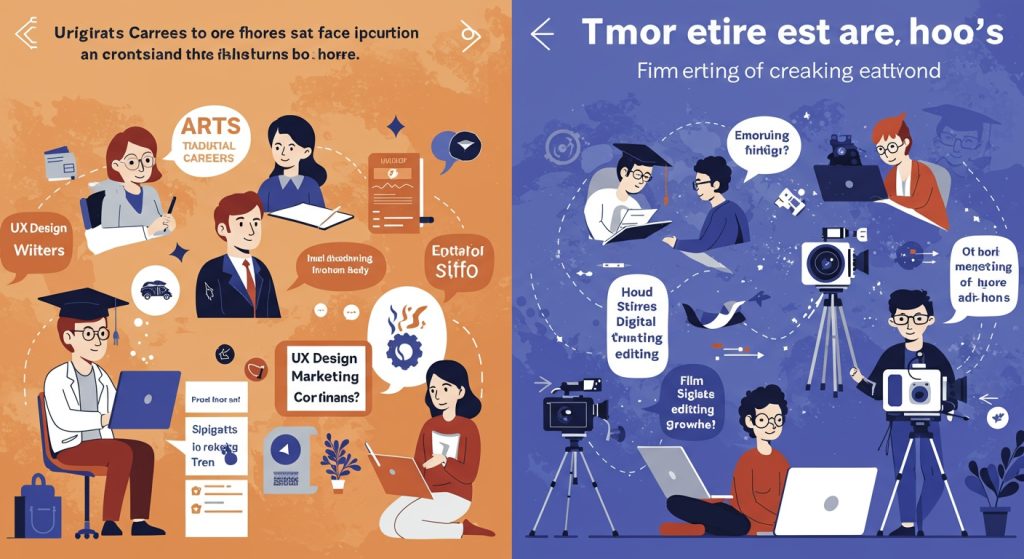Artificial Intelligence is reshaping industries, creating unprecedented demand for skilled professionals. This BSc Computer Science program prepares you to capitalize on emerging AI careers. We delve into core machine learning techniques, like deep learning and reinforcement learning. Explore their application in areas experiencing explosive growth, such as autonomous driving, natural language processing. AI-driven healthcare. You will learn to build and deploy intelligent systems using cutting-edge tools and frameworks, preparing you to tackle the ethical and societal challenges that accompany these powerful technologies. Get ready to shape the future of AI.

Understanding the Landscape of AI: Key Concepts and Technologies
Artificial Intelligence (AI) has rapidly transformed from a futuristic concept to a tangible force shaping industries worldwide. For BSc Computer Science graduates, grasping the core principles of AI is crucial for navigating emerging career paths. Let’s break down some essential elements:
- Machine Learning (ML): This is a subset of AI that focuses on enabling systems to learn from data without explicit programming. Algorithms are trained on datasets, allowing them to identify patterns, make predictions. Improve their accuracy over time. Think of Netflix recommending movies based on your viewing history.
- Deep Learning (DL): A subfield of ML, deep learning utilizes artificial neural networks with multiple layers (hence “deep”) to assess data with greater complexity. DL excels in tasks like image recognition, natural language processing. Speech recognition. Consider how self-driving cars interpret visual data to navigate roads.
- Natural Language Processing (NLP): NLP deals with the interaction between computers and human language. It encompasses tasks like text analysis, sentiment analysis, machine translation. Chatbot development. Imagine how Google Translate effortlessly converts text between languages.
- Computer Vision (CV): This field focuses on enabling computers to “see” and interpret images and videos. Applications range from facial recognition and object detection to medical image analysis and autonomous navigation. Consider how security systems use facial recognition to identify authorized personnel.
- Robotics: AI-powered robots are revolutionizing industries from manufacturing to healthcare. These robots can perform complex tasks autonomously, often in environments that are hazardous or unsuitable for humans. Think of robotic arms assembling cars on a factory floor or surgical robots performing minimally invasive procedures.
Navigating the Career Maze: Popular AI Roles for BSc Graduates
A BSc in Computer Science provides a strong foundation for pursuing a variety of exciting careers in AI. Here’s a glimpse into some of the most sought-after roles:
- Machine Learning Engineer: ML Engineers are responsible for designing, developing. Deploying machine learning models. They work closely with data scientists to translate theoretical models into practical applications. This role requires strong programming skills, a solid understanding of algorithms. Experience with machine learning frameworks like TensorFlow or PyTorch.
- Data Scientist: Data Scientists review large datasets to extract meaningful insights and identify trends. They use statistical methods, machine learning algorithms. Data visualization tools to solve complex business problems. This role demands strong analytical skills, proficiency in programming languages like Python or R. Expertise in data manipulation and analysis techniques.
- AI Research Scientist: Research Scientists push the boundaries of AI by developing new algorithms, techniques. Models. They often work in academic or research institutions, conducting experiments and publishing their findings in scientific journals. This role requires a strong theoretical foundation in mathematics, statistics. Computer science, as well as a passion for innovation and discovery.
- NLP Engineer: NLP Engineers specialize in developing applications that can grasp, interpret. Generate human language. They work on projects like chatbots, virtual assistants, machine translation systems. Sentiment analysis tools. This role requires a deep understanding of linguistics, natural language processing techniques. Programming skills in languages like Python or Java.
- Computer Vision Engineer: Computer Vision Engineers develop systems that can “see” and interpret images and videos. They work on applications like facial recognition, object detection, image classification. Autonomous navigation. This role requires expertise in image processing techniques, computer vision algorithms. Programming skills in languages like Python or C++.
- Robotics Engineer: Robotics Engineers design, build. Maintain robots that can perform a variety of tasks. They integrate AI algorithms into robotic systems to enable autonomous operation and intelligent behavior. This role requires a strong understanding of mechanical engineering, electrical engineering, computer science. AI.
Skills That Open Doors: Essential Technical and Soft Skills
While a BSc in Computer Science provides a solid academic foundation, developing specific technical and soft skills is crucial for success in the AI field. Here’s a breakdown of the key skills employers are looking for:
- Programming Languages: Proficiency in programming languages like Python, Java, C++. R is essential for developing AI applications. Python is particularly popular due to its extensive libraries for machine learning, data analysis. Scientific computing.
- Machine Learning Frameworks: Familiarity with machine learning frameworks like TensorFlow, PyTorch, scikit-learn. Keras is crucial for building and deploying machine learning models.
- Data Analysis and Visualization: The ability to review large datasets and visualize insights using tools like Pandas, NumPy, Matplotlib. Seaborn is essential for data scientists and machine learning engineers.
- Cloud Computing: Experience with cloud platforms like AWS, Azure. Google Cloud is increasingly essential for deploying and scaling AI applications.
- Mathematics and Statistics: A strong foundation in mathematics and statistics is essential for understanding the underlying principles of machine learning algorithms and data analysis techniques.
- Problem-Solving Skills: AI professionals need to be able to identify and solve complex problems using analytical and critical thinking skills.
- Communication Skills: The ability to communicate complex technical concepts clearly and effectively to both technical and non-technical audiences is crucial for collaboration and success.
- Teamwork Skills: AI projects often involve multidisciplinary teams, so the ability to work effectively with others is essential.
- Creativity and Innovation: The AI field is constantly evolving, so the ability to think creatively and develop innovative solutions is highly valued.
The Tools of the Trade: Essential AI Platforms and Libraries
The AI landscape is rich with powerful platforms and libraries that streamline development and deployment. Familiarizing yourself with these tools is essential for a BSc Computer Science graduate aiming for an AI career:
- TensorFlow: An open-source machine learning framework developed by Google, TensorFlow is widely used for building and training deep learning models. It offers a flexible architecture and supports a variety of programming languages, including Python and C++.
- PyTorch: Another popular open-source machine learning framework, PyTorch is known for its ease of use and dynamic computation graph. It is particularly well-suited for research and development.
- Scikit-learn: A comprehensive library for machine learning in Python, scikit-learn provides a wide range of algorithms for classification, regression, clustering. Dimensionality reduction. It is a great starting point for learning machine learning concepts.
- Keras: A high-level API for building and training neural networks, Keras simplifies the development process and allows you to quickly prototype deep learning models. It can run on top of TensorFlow, PyTorch, or other backends.
- Pandas: A powerful library for data manipulation and analysis in Python, Pandas provides data structures like DataFrames and Series that make it easy to work with structured data.
- NumPy: A fundamental library for scientific computing in Python, NumPy provides support for arrays, matrices. Mathematical functions. It is used extensively in machine learning and data analysis.
- AWS SageMaker: A fully managed machine learning service from Amazon Web Services, SageMaker provides a comprehensive set of tools for building, training. Deploying machine learning models in the cloud.
- Azure Machine Learning: A cloud-based machine learning service from Microsoft Azure, Azure Machine Learning provides a collaborative environment for data scientists and machine learning engineers to build, train. Deploy models.
- Google Cloud AI Platform: A suite of AI services from Google Cloud, AI Platform provides tools for building, training. Deploying machine learning models, as well as pre-trained AI APIs for tasks like image recognition and natural language processing.
Real-World Impact: AI Applications Across Industries
AI is no longer confined to research labs; it’s transforming industries across the board. Here are just a few examples of how AI is being used in real-world applications:
- Healthcare: AI is being used to diagnose diseases, develop new drugs, personalize treatment plans. Improve patient care. For example, AI-powered image analysis can detect tumors in medical scans with greater accuracy than human radiologists.
- Finance: AI is being used to detect fraud, manage risk, automate trading. Personalize financial services. For example, AI algorithms can review transaction data to identify suspicious patterns and prevent fraudulent activity.
- Manufacturing: AI is being used to optimize production processes, improve quality control, automate tasks. Reduce costs. For example, AI-powered robots can perform repetitive tasks on the assembly line with greater speed and precision than human workers.
- Retail: AI is being used to personalize shopping experiences, optimize pricing, manage inventory. Improve customer service. For example, AI-powered recommendation engines can suggest products to customers based on their browsing history and purchase behavior.
- Transportation: AI is being used to develop self-driving cars, optimize traffic flow. Improve logistics. For example, AI algorithms can assess real-time traffic data to adjust traffic signals and reduce congestion.
- Agriculture: AI is being used to optimize crop yields, manage resources. Improve sustainability. For example, AI-powered drones can monitor crop health and identify areas that need attention.
Ethical Considerations: Navigating the Responsible AI Landscape
As AI becomes more pervasive, it’s crucial to consider the ethical implications of its development and deployment. BSc Computer Science graduates entering the AI field have a responsibility to ensure that AI is used ethically and responsibly. Some key ethical considerations include:
- Bias: AI algorithms can perpetuate and amplify existing biases in the data they are trained on. It’s vital to ensure that data is representative and unbiased to avoid discriminatory outcomes.
- Privacy: AI systems often collect and process large amounts of personal data. It’s vital to protect user privacy and ensure that data is used responsibly.
- Transparency: AI algorithms can be complex and opaque, making it difficult to comprehend how they make decisions. It’s crucial to promote transparency and explainability in AI systems.
- Accountability: It’s crucial to establish clear lines of accountability for the decisions made by AI systems. Who is responsible when an AI system makes a mistake or causes harm?
- Job Displacement: AI automation has the potential to displace workers in certain industries. It’s vital to consider the social and economic impact of AI and develop strategies to mitigate job displacement.
Career Guidance: Charting Your Path to AI Success
Embarking on a career in AI requires careful planning and strategic development. Here’s some career guidance to help BSc Computer Science graduates navigate their path:
- Focus on Foundational Skills: Strengthen your understanding of core computer science principles, mathematics. Statistics. These fundamentals are crucial for building a strong foundation in AI.
- Specialize in a Niche: Identify a specific area of AI that interests you, such as NLP, computer vision, or robotics. Deepen your knowledge and skills in that area to become a specialist.
- Build a Portfolio: Create personal projects that demonstrate your AI skills. Develop machine learning models, build AI applications. Contribute to open-source projects.
- Network with Professionals: Attend AI conferences, workshops. Meetups. Connect with AI professionals on LinkedIn and other social media platforms.
- Seek Internships and Entry-Level Positions: Gain practical experience through internships and entry-level positions in AI-related roles. This will provide valuable hands-on experience and help you build your resume.
- Continuously Learn and Adapt: The AI field is constantly evolving, so it’s crucial to stay up-to-date with the latest trends and technologies. Take online courses, read research papers. Attend industry events.
- Consider Further Education: A Master’s or PhD in Computer Science or a related field can provide you with advanced knowledge and skills, opening up opportunities for research and leadership roles.
Future Trends: Staying Ahead in the AI Revolution
The field of AI is rapidly evolving, with new technologies and applications emerging constantly. Staying ahead of the curve requires continuous learning and adaptation. Here are some key trends to watch out for:
- Explainable AI (XAI): As AI systems become more complex, there’s a growing need for transparency and explainability. XAI aims to develop AI models that can explain their decisions in a human-understandable way.
- Federated Learning: Federated learning enables machine learning models to be trained on decentralized data sources without sharing the data itself. This is particularly useful for applications where data privacy is a concern.
- Generative AI: Generative AI models can create new content, such as images, text. Music. This technology has the potential to revolutionize industries like art, entertainment. Marketing.
- AI Ethics and Governance: As AI becomes more pervasive, there’s a growing focus on developing ethical guidelines and governance frameworks for AI development and deployment.
- Quantum Computing and AI: Quantum computing has the potential to accelerate AI development by enabling the training of more complex models and the solution of previously intractable problems.
Conclusion
Let’s view this not as an ending. As the starting line. Having explored the exciting landscape of emerging AI careers open to BSc Computer Science graduates, the key takeaway is adaptability. The field is evolving at warp speed, with advancements in areas like generative AI and reinforcement learning reshaping job roles constantly. Don’t be afraid to specialize; consider focusing on niche areas like AI ethics or explainable AI (XAI), which are increasingly vital. The most practical tip I can offer? Never stop learning. Online courses, Kaggle competitions. Contributing to open-source AI projects are fantastic ways to stay sharp. Personally, I found that attending AI-focused conferences, even virtually, opened doors to invaluable networking and learning opportunities. Your success in this field hinges on a combination of technical skill, critical thinking. A proactive approach to continuous learning. Embrace the challenges, stay curious. Remember that the future of AI is being written right now – and you have the potential to be one of its authors. Aim high. Good luck!
More Articles
BSc Computer Science: Top In-Demand Career Paths of the Future
Future-Proof Your Career: Job Options After BSc Computer Science Degree
Future is Bright: Emerging Job Roles After BSc Computer Science in 2025
BSc Computer Science: Exploring Lucrative Freelance Options for Graduates
FAQs
So, I’m thinking about a BSc in Computer Science and I’m really interested in AI. Will this degree actually prepare me for AI jobs?
Absolutely! A BSc in Computer Science is a fantastic foundation for a career in AI. You’ll learn the core programming, data structures, algorithms. Math skills that are crucial. Think of it as building the strong base upon which you’ll later add the AI-specific knowledge and skills.
What specific AI-related jobs could I realistically get with a BSc in Computer Science?
Great question! You’re looking at roles like Machine Learning Engineer (entry-level, likely requiring further training), AI Software Developer, Data Scientist (often involves more statistics), AI Research Assistant. Even AI Product Manager (especially after gaining some experience). It’s all about showcasing your skills and passion for AI projects during your degree!
I’ve heard AI is all about fancy math. How much math are we really talking about?
Okay, let’s be honest – there is math! Linear algebra, calculus, probability. Statistics are all crucial. But don’t freak out! Your BSc program will cover these. The key is understanding the concepts behind the math so you can apply them to AI problems. You don’t need to be a math genius, just comfortable with the fundamentals.
What programming languages should I focus on if I want to get into AI?
Python is your best friend here! It’s the go-to language for AI and machine learning. Knowing languages like R and Java can also be beneficial. Prioritizing Python is a solid move. Get comfortable with libraries like TensorFlow, PyTorch. Scikit-learn – you’ll be using them a lot!
Is a BSc enough, or will I definitely need a Master’s to actually work in AI?
A BSc can definitely get your foot in the door, especially for more software engineering focused AI roles. But, a Master’s degree (or even a PhD) can open up more specialized and research-oriented opportunities. It really depends on your career goals. Start with the BSc, get some experience. Then decide if further education is right for you.
Besides classes, what else can I do during my BSc to boost my AI career prospects?
Get practical! Work on personal AI projects (even small ones), contribute to open-source AI projects on platforms like GitHub, participate in Kaggle competitions. Network with people in the AI field. Internships are gold! They give you real-world experience and can lead to full-time job offers. Building a portfolio of AI-related work is super crucial.
AI is changing so fast! Will what I learn in my BSc be outdated by the time I graduate?
That’s a valid concern! AI is rapidly evolving. That’s why it’s crucial to develop a strong foundation in the fundamentals of computer science. Focus on learning how to learn, staying updated with the latest research. Being adaptable. Your BSc will give you the tools to keep up with the ever-changing landscape of AI.



